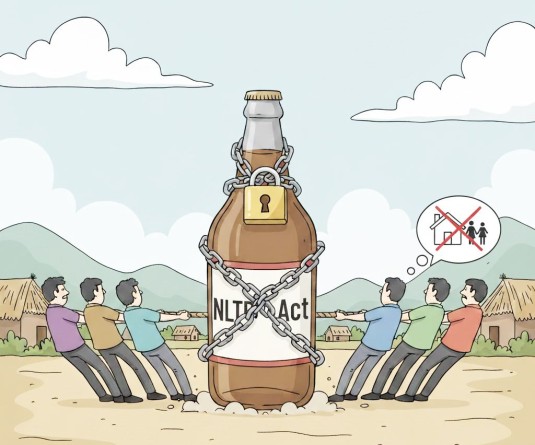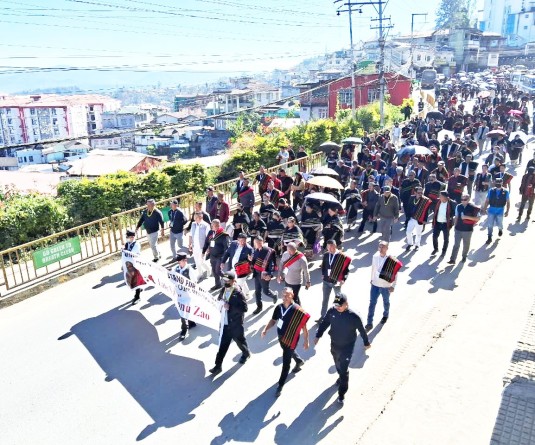
A false polarity is created & discussion bottled when women professing equality are termed ‘anti men’ and blamed for their plight; state level consultation workshop on Naga women held on August 29-30
Morung Express News
Dimapur | August 31
“Are the women sleeping?” Apila Sangtam, an advocate in the Kohima bench of the Gauhati High Court asked this while making a presentation on August 29. She was at a State level consultation workshop on Naga women’s rights and role in Naga society organized by Bethesda Youth Welfare Centre in collaboration with the North East Dialogue Forum at Dimapur’s Circuit House.
She was presenting on ‘Legal rights, customary laws and its accessibility and impact on Naga women.’ She recognized that 70% of the world’s poorest are women, that women own less than 10% of the world’s property and while women’s contribution to the global economy remains huge, their labour is routinely undervalued and undercounted.
Can this be squarely blamed on women? Having explained the constitutional and legal rights available for women in the Indian Union today, she felt that the government had done its bit but Naga women had been unable to do their bit to access rights.
Sangtam’s presentation was preceded by a discussion.
Some young women students attending the workshop wanted to know why women’s status and representation in political affairs remained low despite the labour they contributed or instances of domestic violence against women routinely brushed under the carpet?
To this, a few older women participants responded that while many contributions made by Naga women, particularly mothers as peacemakers, are not fully known, “we must not generalize” and take an “anti men” position. This argument has been made by other women leaders in another women’s rights workshop held recently in Dimapur. As in any other society, there are many cases of Naga men helping women lead successful public lives.
But the moot point is not about exceptions but the rule. Thus, the younger women persisted with their position. They were not polarizing society into men and women, or being “anti men” but searching for methods to tackle gender based discrimination that the social system allows for; a holistic, shared, society can then be created.
“We should be empowered to bear discrimination,” responded an older participant. A few of them then smiled, looked at each other, nodded and said of the younger lot, “they are too young to understand.”
This effectively put a lid on the subject.
Can education help?
The attitude has become endemic wherein young women seeking change are chided while older women seeking change are slated as ‘immoral’.
Neither judgment, however, could be imposed on Dr. Joyce Zinyu, Executive Director, Children Affected By AIDS in Nagaland (CABA), whose presentation on ‘Socio economic issues of Naga women and their role and challenges’ had sparked this discussion.
She gave an overview of the historic head hunting days when women used to carry loads back from fields to home so that men can have their hands free to defend the women and children. Head hunting may be history but not the load on the women’s backs.
“Today men have become freer than women as the latter continues to work hard on fields as well as the home,” noted Dr. Joyce using the phrase “role-less men and overburdened women.”
In her observation, Naga women are in a phase of transition with more “progressive change” in women’s economic development than educational achievement. Far from sleeping, women have taken up small scale organic farming, are forest foragers, weavers, producers of local arts and crafts, and flower growers while some are entrepreneurs in the open market.
Fresh issues have sprouted too. Gender labour has become more segregated, women still carry the burden of reproductive labour alongside their productive labour in the markets without any additional wages, are plagued by the same issues of corruption, taxation, poor administration as anyone else and have to also maintain familial and other social obligations. Added to the conflict of yesteryears and no rights to traditional property, women’s capacities to network, learn and earn are severely debilitated. Poverty rises.
Urban Naga women face fewer challenges, acknowledged Dr. Joyce.
But they are not the majority of Naga women, nor are they without challenges.
For former Additional Advocate General and former CBI standing counsel, P. Pius Lotha, there is no gender discrimination in Naga society and the whole discussion lacks merit. His topic of presentation for the day was ‘Mineral oil, coal mining and its impact on women; AFSPA and its long term impact on women and girls in Nagaland.’
Apart from his topic, he focused on the problems faced by urban women. He highlighted the lack of education among Naga women that leaves them open to exploitation in metropolitan cities. While stating that education is key, he acknowledged that even highly educated women in white collar jobs face harassment at the hands of male colleagues.
Is it ‘anti men’ to make such a claim? Offering a way out for Naga women from the rut of tradition versus modernity, or whether and how women should participate politically to change the status quo, was A. Sentiyula’s presentation on August 30.
Killing the angel
An Assistant Professor at Dimapur Government College, A. Sentiyula presented a paper titled Killing the Angelic Peacemaking Mother of ‘Time Immemorial.’
She noted that “with the Peacemaker image is the automatic linkage of the image of the Mother, ready to step in to pacify warring, raging men, or soothe and care for weak, diseased, addicted children.”
If Naga women are to “progress beyond the boundaries delineated by society,” as the discussion through August 29 of the workshop had indicated, then the “Peacemaker-Mother image” needs to be updated, suggested Sentiyula on August 30.
By this, she did not suggest that Naga women abandon their peacemaking efforts or motherhood but learn the best of consensus building and problem solving from the years of making these efforts and take them to state politics that have been plagued by misgovernance and corruption.
This way, she noted, the society can plan ahead together—men and women sitting on the table as equals (they are, after all, on the same side)—and give a fresh chance to creating a robust corruption free society.


.jpg)


.jpg)
